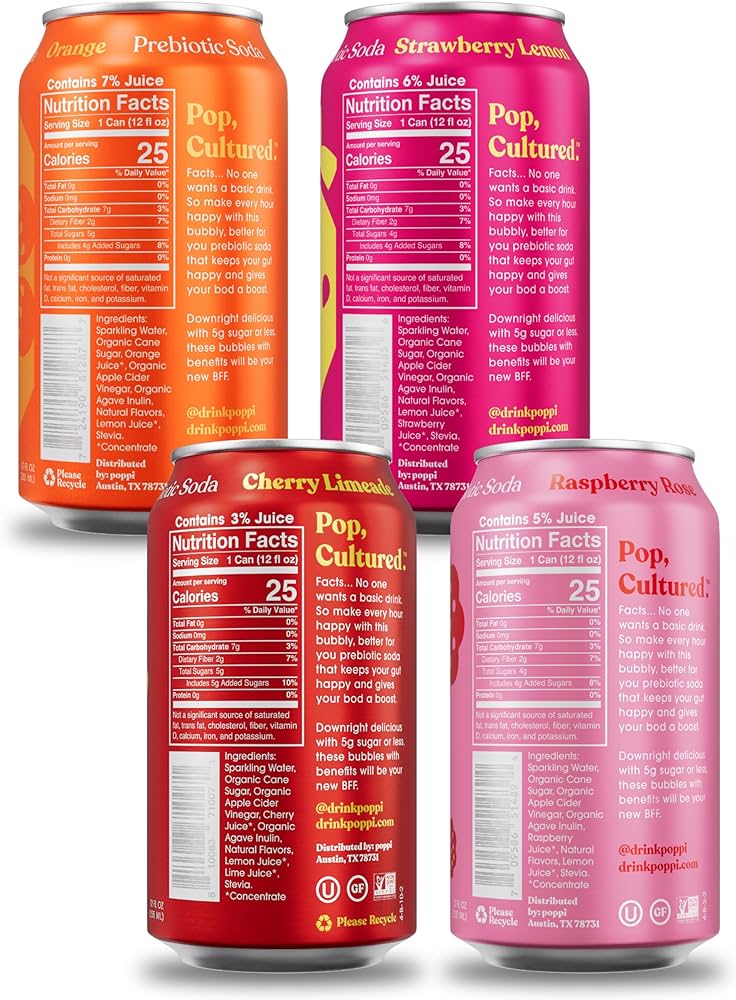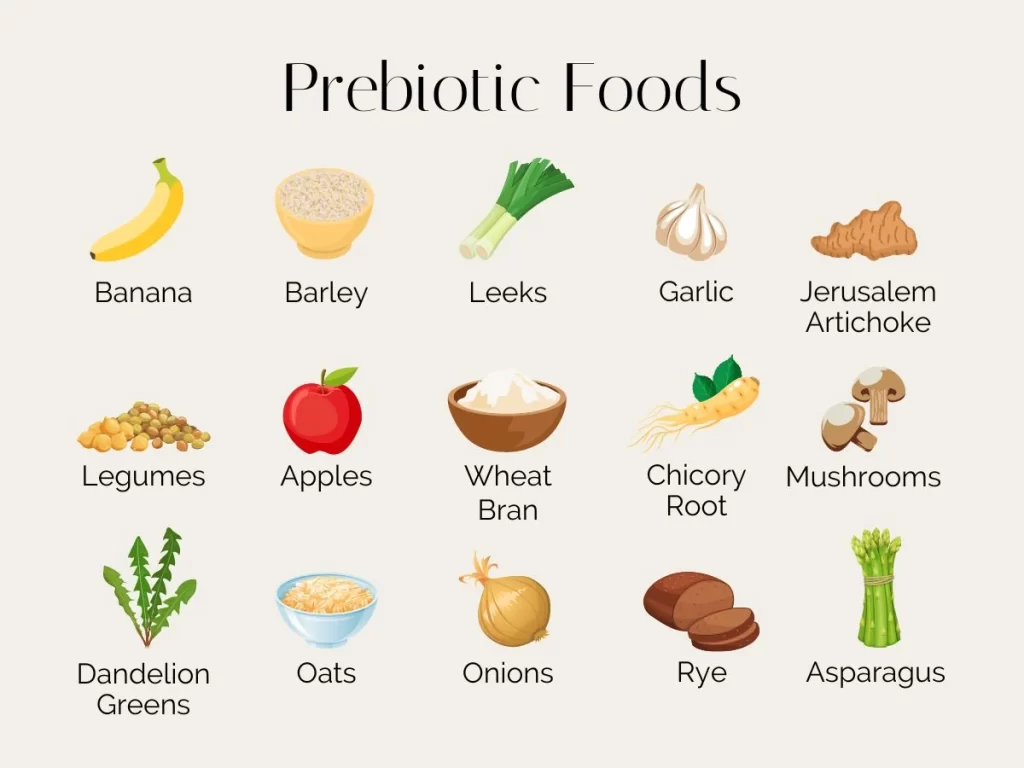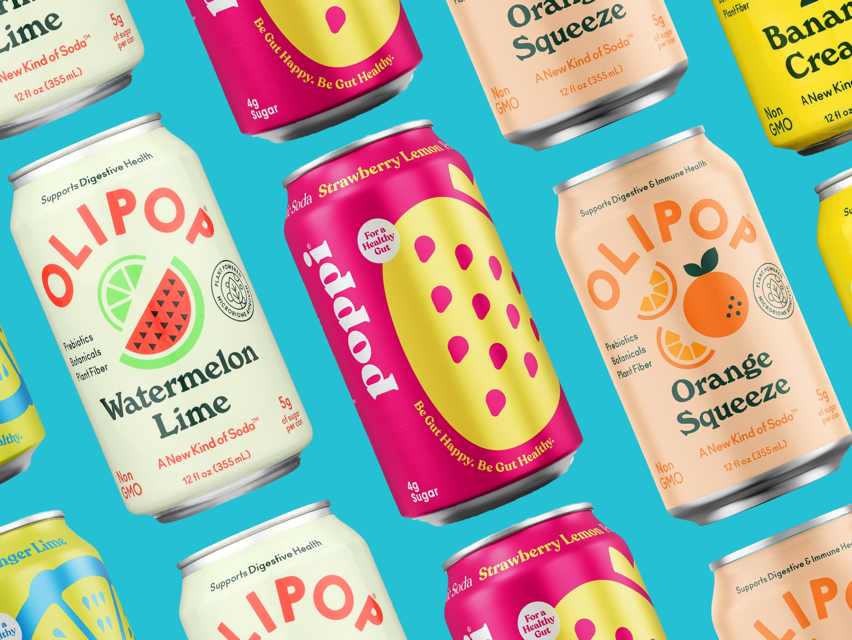There is a possibility that Prebiotic Soda could be beneficial to gut health since it contains fiber, which supplies the bacteria in the gut with fuel and helps to maintain a healthy immune system. A number of studies have suggested that consuming between three and five grams of prebiotics can be beneficial to your digestive system.
There is some evidence that prebiotic soda can help reduce the risk of cardiovascular disease, lower cholesterol levels, lessen the likelihood of constipation, and preserve gut health when consumed regularly. Individuals who have a history of irritable bowel syndrome and other gastrointestinal problems should exercise caution when taking prebiotic soda. It is crucial to remember that increasing the amount of fiber in one’s diet may not be good for everyone due to certain medical conditions.
In addition, it is vital to study food labels in order to verify that the prebiotic soda does not include excessive amounts of sugar or artificial sweeteners, as these substances have the potential to induce gastrointestinal distress among individuals.
Benefits of Drinking Prebiotic Sodas
In terms of intestinal health, prebiotic soda may have a number of possible benefits, including the following:
Feeding the bacteria in the gut: Inulin, a type of prebiotic fiber, is one of the ingredients that can be found in prebiotic sodas. This fiber makes it possible for the gut to produce more beneficial bacteria.
Improving gut bacteria balance: Eating meals or supplements containing both prebiotics and probiotics can help balance gut bacteria.
Lowering added sugar intake: The consumption of prebiotic sodas is often lower than that of standard sodas, which makes them a healthier alternative. Prebiotic drinks have less added sugar than traditional sodas.
Promoting gut health: In addition to promoting the growth of beneficial bacteria in the stomach, prebiotic drinks may also enhance bowel regularity and minimize the risk of digestive diseases that are caused by an imbalance in the bacteria that are found in the gut.
Reducing inflammation: On the other hand, prebiotics have been demonstrated to reduce inflammation in the gastrointestinal tract, which may contribute to an improvement in overall health.
Increasing the strength of the immune system: a robust immune system can be supported by a healthy microbiome in the gut,
Decreasing appetite and increasing feelings of fullness: At the same time as prebiotic fibres in prebiotic soda can help lower hunger and promote feelings of fullness, they can also help reduce overall calorie intake, which might potentially contribute to a reduction in overall calorie consumption.
Improving mental health: A healthy gut microbiota has been related to enhanced mood as well as reduced feelings of anxiety and sadness, which is a positive step towards improving mental health.
On the other hand, it is essential to keep in mind that not all prebiotic sodas are made equal. Some of them may contain significant quantities of added sugars or artificial sweeteners, both of which can have adverse effects on one’s general health. When it comes to the consumption of prebiotic soda, individuals who have sensitive intestines or certain medical conditions should exercise caution because it has the potential to produce discomfort in the digestive tract in certain individuals.
You may also like: SMALL BUMPS UNDER THE SKIN EXPLAINED BY MILIA (MILIALAR)
Common Prebiotic Ingredients in Sodas

Soda often contains a number of prebiotic components, including the following:
The prebiotic fiber found in food: Inulin is one example of the prebiotic dietary fiber that is commonly included in prebiotic sodas. This fiber helps to nourish the beneficial bacteria that are found in the gut.
Apple cider vinegar: Some prebiotic sodas may contain apple cider vinegar, which may have possible health advantages for the digestive system and the health of the gut.
Herbs and botanicals: Prebiotic sodas may also contain herbs and botanicals, which not only contribute to the overall flavor profile but also have the potential to deliver extra health advantages.
A fizzy, tasty drink that not only satisfies the demand for soda but also improves digestive health by supporting the growth of beneficial gut bacteria is produced by the combination of these ingredients, which work together to produce the drink.
What are Some other Food or Drink Products that Contain Prebiotic Ingredients?

Prebiotic sodas are not the only food or drink product that contains prebiotics.
- Onions: Onions contain prebiotics like inulin and fructooligosaccharides, which support a healthy digestion and gut microbiome.
- Garlic: Garlic is a good source of inulin and fructooligosaccharides, which can help support good gut bacteria and overall health.
- Dandelion Greens: High in fiber and inulin (a prebiotic which supports gut health) as well as antioxidants, dandelion greens contain a lot of inulin.
- Chicory Root: Rich in antioxidants and prebiotics, chicory roots are a great addition to your diet.
- Jerusalem artichokes contain high levels of fiber, particularly inulin and antioxidants that support colon health and the growth of healthy gut bacteria .
- Bananas are rich in inulin, which can increase the number of healthy bacteria in your gut and reduce bloating.
- Whole oats: Oats contain soluble fibers and prebiotics that support gut health by feeding good bacteria.
- Berries: Berries contain soluble fibers and polyphenols that act as anti-inflammatory agents and promote gut health.
- Mushrooms are rich in prebiotic polysaccharides, such as beta-glucan. These can promote healthy gut bacteria and digestive health.
- Cocoa: Cocoa contains polyphenols, which are beneficial to the gut microbiome. It is a great addition to your diet for gut health.
How do Prebiotic Sodas Compare to other Sugar-Free Sodas?
Prebiotic sodas are beverages that do not contain any sugar and include prebiotic fibre, which is beneficial to the health of the digestive tract, the brain, and the immune system. There is a relatively minimal amount of sugar in them, and they frequently include components such as apple cider vinegar, herbs, botanicals, and minerals. Cassava root, chicory root, Jerusalem artichoke, nopal cactus, calendula flower, and kudzu root are some of the prebiotics that are utilised by well-known companies such as OLIPOP and Poppi. As opposed to Poppi, which only contains two grammes of fibre per can, OLIPOP has a larger fibre content, which is nine grammes per can. The use of prebiotic drinks as a replacement for a diet that is well-balanced is, however, something that specialists strongly advise against.
The Potential Side Effects of Drinking Prebiotic Sodas
It is possible that prebiotic sodas will cause adverse effects that will have an impact on your digestive system. Side symptoms such as cramps, bloating, and gas are among the most frequently experienced. Due to the high fibre content of prebiotic sodas, they may have adverse effects in some people. Consuming an excessive amount of this can be a source of discomfort. If you want to avoid these problems, it is recommended that you restrict your consumption and drink water in addition to soda in order to maintain proper hydration1. Additionally, it is possible that prebiotic sodas are not appropriate for all individuals.
The consumption of prebiotic sodas is not recommended for individuals who suffer from diseases such as irritable bowel syndrome (IBS) or who have an allergy to chicory fiber. When selecting prebiotic drinks, one should use caution. Neither sugar nor artificial sweeteners nor flavors should be present in excessive quantities in these products.
Conclusion on Prebiotic Soda
In order to provide a healthier alternative to standard sodas, prebiotic sodas are loaded with prebiotics, which are beneficial to the health of the gut. These beverages provide a number of health benefits, including enhanced digestion, improved gut function, and support for the immune system. On the other hand, tolerance might vary from person to person, and adverse effects can arise. There should be a limited amount of sugar, artificial sweeteners, and preservatives in prebiotic sodas, and they should not be used as a substitute for a well-balanced diet that is abundant in whole foods.
FAQs
How much prebiotic soda is safe to drink per day?
According to the information given, it’s generally safe to drink one can of prebiotic beverage per day depending on your tolerance for fiber. It is important to introduce prebiotic soda slowly and moderately to allow your stomach to adjust Start with small amounts of high-fiber products and gradually increase to reduce the risk for side effects such as gas, bloating, and diarrhea.
What are some common brands of prebiotic sodas?
Some common brands of prebiotic sodas include:
- Olipop
- Poppi
- Health-Ade’s Booch Pop
- Culture Pop
What are the flavors available in prebiotic sodas?
Some common flavors available in prebiotic sodas include:
- Olipop: Strawberry Vanilla, Cherry Vanilla, Vintage Cola, Classic Root Beer, Orange Creamsicle.
- Poppi: Raspberry Rose, Strawberry Lemon, Ginger Lime, Orange.
- Culture Pop: Orange Mango, Ginger Lemon.
Are there any prebiotic sodas that are not sweetened?
There are prebiotic drinks that do not contain sugar. Mayawell Bubbly prebiotic soda, for example, is sweetened using organic agave. It contains no apple cider vinegar. It is low in sugar and calories and designed to promote gut health and immunity. This soda also contains 5g of prebiotic fiber in each can.

